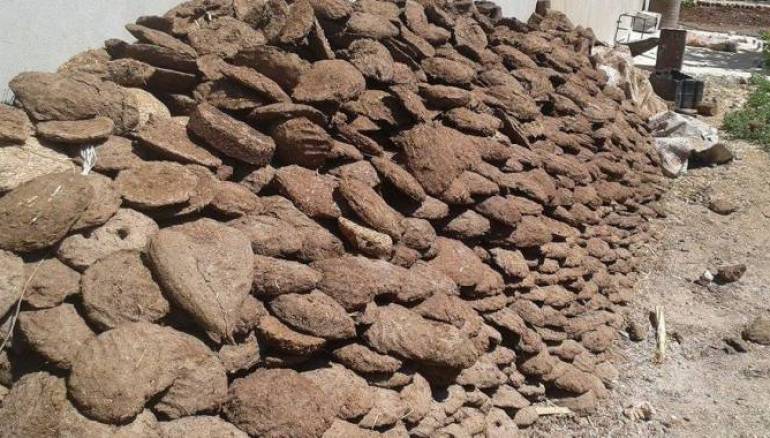Assad forces’ blockade on the southern Damascus suburbs and its ban on the entrance of fuel, coupled with widespread unemployment and trying economic conditions, has forced the residents to use animal waste, plastic, and shoes as alternatives to fuel.
Abou Ratib, 38, a resident in the town of Yalda, spoke to Iqtissad about the manufacturing of “Jileh” where cow dung is collected in a large plastic container. He adds hay and straw and then he mixes it in order to tightly pack it. It is then left for around a week, and then placed in the sun where it is turned into small discs ready to burn in heaters.
Abou Ratib says: “We had to use this as an alternative to fuel because the population in the areas south of the capital do not have the money to buy wood (for burning).” He adds that the price reaches 100 Syrian pounds per kilo as a result of the spread of poverty and blockade imposed for three years.
He pointed out that most families in the towns of Yalda, Babila, and Bayt Sahim use Jileh as an alternative for food and diesel.
Abou Ali, 40, a resident in the Palestinian Yarmouk camp and a father of three children, says: “I do not have the money to buy food for me and my kids to be able to buy wood. So, I resorted to using old shoes, plastic, and nylon for the heater instead of wood.” He says that although it releases harmful toxins into the air, which may lead to diseases, he does not have any other way to create heat. Abou Ali adds that most families in Yarmouk depend on these materials as alternative to heating because all the wood has been completely consumed over the past years.
For her part, Om Mohamed, 50, is a resident in the Rija area, which is besieged by Assad forces and Palestinian militias on the one hand and the Islamic State group on the other. She cares for her five children after her husband was killed by shelling on the area. Om Mohamed spoke to Iqtissad: “I do not have any alternative for heating, but I collect some plastic and old shoes and clothes as well as small (pieces of) wood from destroyed houses to use for cooking and heating. The ISIS and regime’s blockade has drained us.”
Regardless of the situation, the smile of hope does not depart from the faces of residents of southern Damascus, which increases their will to stand in the face of Assad’s tyranny and to find alternative solutions to face their blockade.
This article was edited by The Syrian Observer. Responsibility for the information and views set out in this article lies entirely with the author.


